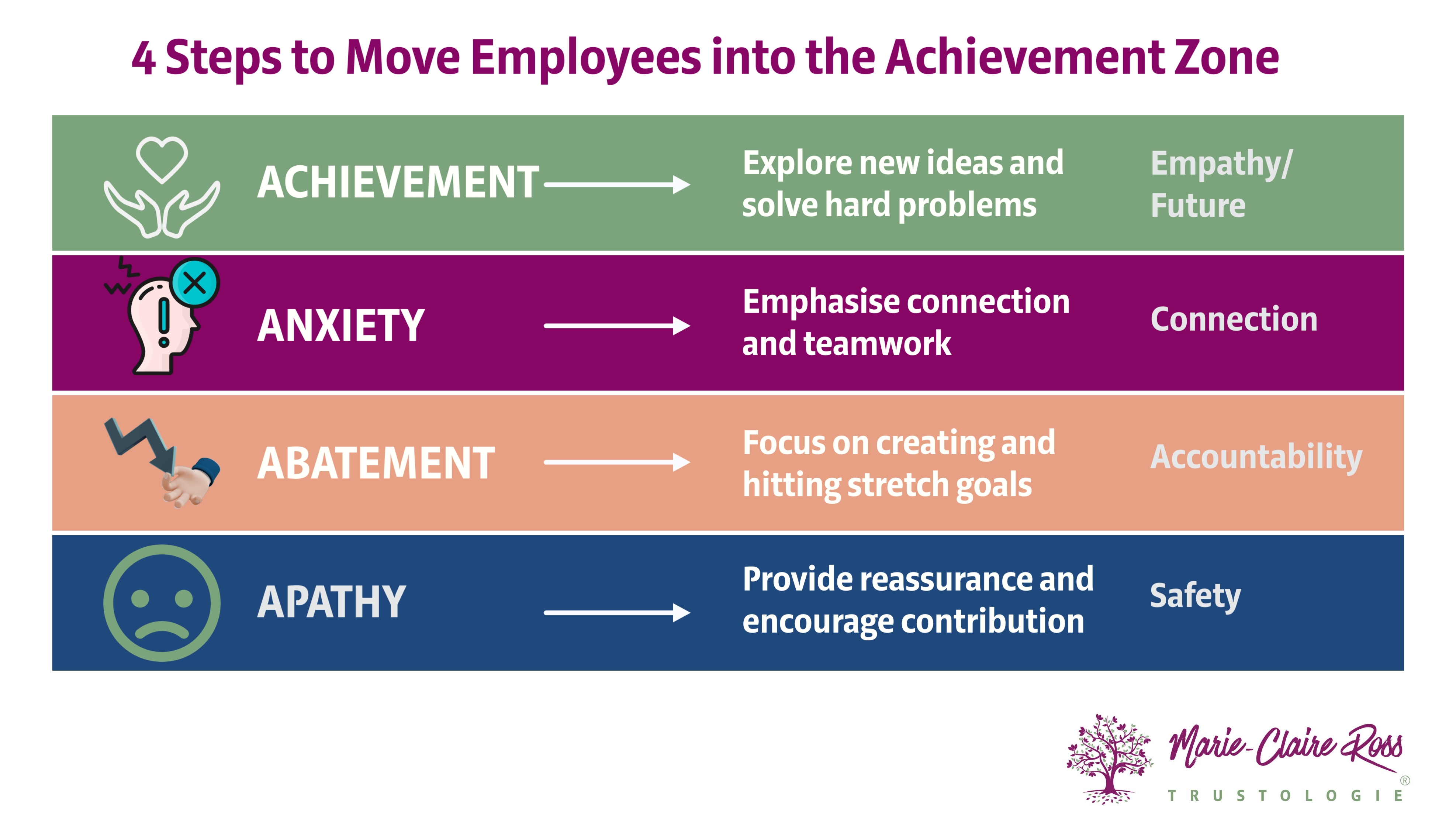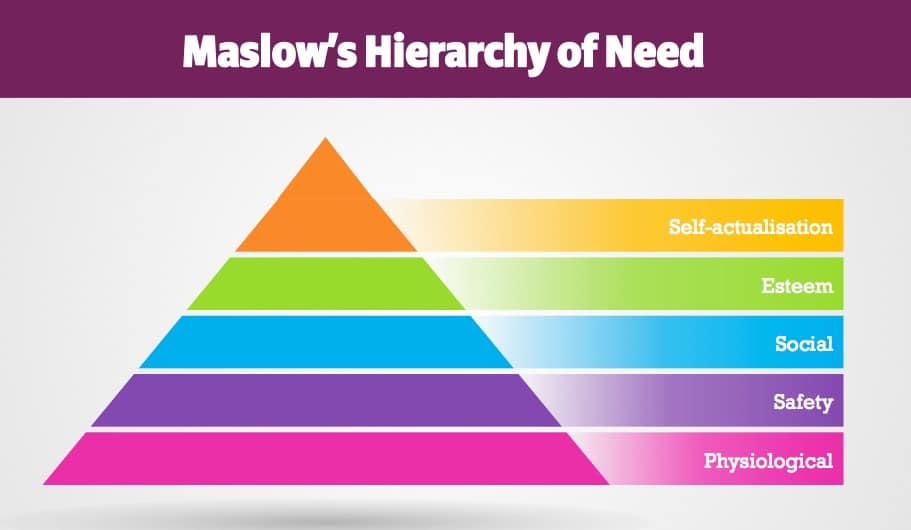11 min read
4 Practical Strategies for Better Emotional Management in the Workplace
I have a friend who often finds herself at the mercy of her emotions. Recently, she called me to rehash a confrontation she’d had with a group of...
Develop leaders, strengthen executive teams and gain deep insights with assessments designed to accelerate trust and performance.

Transform how your leaders think and perform with keynotes that spark connection, trust and high-performance cultures.

Explore practical tools, thought-leadership and resources to help you build trusted, high-performing teams.

Trustologie® is a leadership development consultancy founded by Marie-Claire Ross, specialising in helping executives and managers build high-trust, high-performing teams.

4 min read
Marie-Claire Ross : Updated on December 8, 2022

The last couple of years have been exhausting. Throw in a pandemic, home schooling, managing COVID outbreaks (and that's just within your own family), high workloads, supply chain issues, the increasing cost of living, floods and global political tensions and it's enough to make anyone head for the safety of their bed.
Just as things seemed to be sort of returning to a pre-COVID normal, we now have the threat of a recession, job losses and dare I say it - another COVID wave and maybe another (global?) lockdown.
Fiddlesticks!
While it's too early to crack the champagne and take some very needed days off to recuperate from 2022 alone, I thought it wise to provide you with some tips on how to help energise your team and make it to Christmas (and beyond).
1. Be grateful - This might sound underwhelming, but if you've got a job. Be thankful. If you have consistent money coming in to support your family, you are doing okay. If you and your family are in good health - be thankful. If you have a great boss or wonderful colleagues - be thankful. If you have a roof over your head - be thankful. If you have a pet that loves you - be thankful. If you woke up alive this morning - be thankful. There is so much to be thankful for in our lives, if we only took the time to look.
Help your team realise things are better than they seem by asking each team member at your next team meeting - what are you grateful for? Focusing on the positives in our lives can be so helpful to our wellbeing.
2. Give thanks - Following on from the last tip is giving people thanks for the work they have done. People love hearing when they have done a good job.
Just make sure you don't throw out a thanks without being specific on how a person has helped you. Leaders who say thanks a lot without backing it up, do not come across as very believable.
So be specific with your praise. Let people know what pleased you by saying "Thanks for doing x, it helped me by reducing the time I had to spend finishing the report."
Encourage team thanks by asking team members at your next meeting "Who has helped you out in the last week? Tell us what they have done that made your life easier."
3. Help people find meaning in their work - It might seem counter-intuitive, but volume of work isn't necessarily energy depleting. Instead, what is demotivating is when there is a lack of meaning in work. It means toxic interactions with co-workers and difficult trade-offs between one's wellbeing and the demands of their job become increasingly difficult.
As the team leader, you are in charge of modelling the right high-performance behaviours. This also means highlighting that each employee is responsible for seeing the meaning within each task and committing to performing beyond an ordinary level. Openly discuss with your team members:
Periodically stepping back and assessing work and actions ensures people are more present to creating a meaningful experience in their careers and making a bigger impact. Read more tips on increasing meaning in your team.
4. Spend time connecting with your people - Recently, I ran a Trusted Leader workshop with operational leaders from emergency services. There were complaints about how hard it was to connect with team members when they operate with 24 hour rosters and they never get to see their staff. Tough predicament.
Yet, it's too easy to write that off as an excuse to not connect with people personally. All it requires is some creativity.
Ideas include spending time to write people a personalised note, creating weekly videos or ringing people up during the shift and ask if there is anything you can do to make their job easier. A five minute phone call is better than no minutes.
What can you do to have more meaningful check-ins with your people?
5. Share your troubles - Okay - so I don't mean be a narcissist and over-share details on what's going on in your life so you can get maximum sympathy. What I mean is being honest if there are issues going on at home that might be impacting your mood and well-being. Remember, you are a role model. Let people know it's okay to not be okay.
Be human and admit when things are hard. It's more authentic and likeable than a boss that displays false bravado.
This also means giving others the opportunity to share what they are finding difficult. Sugar-coating the uncertainty some people are feeling in the world right now, doesn't help anyone.
It is quite possible your employees are fearful of their job certainty. Know that employees in fear are always looking for signs that confirms their worries. Make sure you are transparent with how the business is progressing and share any information that you can. Employees tend to believe the worst when they believe things are being hidden from them.
6. Take a walk - Numerous studies have found a link between spending time in nature and our well-being. The good news is that it doesn't have to take long. Fifteen minutes out in the fresh air is all it takes to reset us.
You can encourage your team members to take a walk if they are getting stressed out. You can also play around with walking meetings. If you are in the office with your team, introduce a walking meeting or walk to a park together and sit down for your meeting. If you have hybrid teams, encourage team members to go for a walk during the meeting.
7. Make time for fun - Be like my cat Riley and make time for fun and games.
Luckily, it is the best time of year to schedule fun. Plan to have a laugh with your team members. There is nothing like food, social drinks and activities to make people merry at this time of year.

8. Debrief and learn from challenges - Typically, when we go through a crisis we are in reactive mode fighting fires. We rarely take the time to sit down and review what we learnt and what we will do better afterwards.
Make time with your team to talk about the big issues that happened throughout the year and what you have learned. Do an After Action Reviews (AAR) that will help you think better, provide shared contextual awareness and ensure you are having learning-focused discussions. It means that when the next crisis appears - you will feel more up to the challenge and have a solid knowledge bank to draw from. It won't be so overwhelming.
As a leader you are responsible for the energy and focus of your team. It's not easy. It means taking care of your own energy and taking the time to rest and recuperate when your energy is low.
You really matter.
Seek support where you can such as coaching, joining a mastermind group and surrounding yourself with like minded friends. Make sure you take time away from work during the holiday break.
Looking after your own health and wellbeing will ensure that you are ready to face 2023 which is most likely to be another year of exciting ups and downs.

11 min read
I have a friend who often finds herself at the mercy of her emotions. Recently, she called me to rehash a confrontation she’d had with a group of...

9 min read
True leadership presence isn’t a performance or a set of charisma hacks; it is the felt experience of who you are being in the room. By cultivating...

13 min read
As teams return from their summer (or winter) break, you may notice subtle shifts in your team’s energy. Even if the end of year was positive, a new...

For over two decades, I have bypassed the usual stress of New Year’s resolutions in favour of a simple, 30-minute practice that grounded me through...

Sitting in front of me is Emma, a quietly spoken woman with dark hair that softly frames her face. She is nervous and avoiding eye contact with me. ...

The pace of change within most organisations is accelerating. It’s now commonplace for companies to be restructuring, changing their business model,...